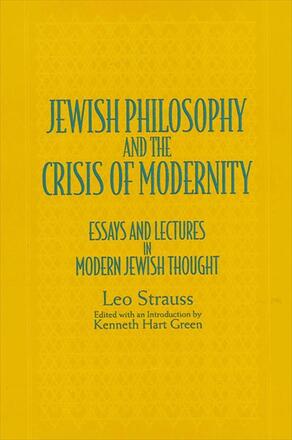
Jewish Philosophy and the Crisis of Modernity
Essays and Lectures in Modern Jewish Thought
Alternative formats available from:
Explores the impact on Jews and Judaism of the crisis of modernity, analyzing modern Jewish dilemmas and providing a prescription for their resolution.
Description
This is the first book to bring together the major essays and lectures of Leo Strauss in the field of modern Jewish thought. It contains some of his most famous published writings, as well as significant writings which were previously unpublished. Spanning almost 30 years of continuously deepening reflection, the book presents the full range of Strauss's contributions as a modern Jewish thinker.
These essays and lectures also offer Strauss's mature considerations of some of the great figures in modern Jewish thought, such as Baruch Spinoza, Hermann Cohen, Franz Rosenzweig, Martin Buber, Theodor Herzl, and Sigmund Freud. They also encompass his incisive analyses and original explorations of modern Judaism (which he viewed as caught in the grip of the "theological-political crisis"): from German Jewry, anti-Semitism, and the Holocaust to Zionism and the State of Israel; from the question of assimilation to the meaning and value of Jewish history. In addition Strauss's two sustained interpretations of the Hebrew Bible are also reprinted.
These essays and lectures cumulatively point toward the "postcritical" reconstruction of Judaism which Strauss envisioned, suggesting it rebuild along Maimonidean lines. Thus, the book lends credence to the view that Strauss was able to uncover and probe the crisis at the heart of modern Jewish thought and history, perhaps with greater profundity than any other contemporary Jewish thinker.
Kenneth Hart Green is Associate Professor in the Department for the Study of Religion at the University of Toronto.
Reviews
"...The wealth of material, the immediacy of Strauss's manner embodied in these papers, their philosophic range, make of this a formidable witness. The editor's introduction on 'a modern Jewish thinker' is finely judged. It places Strauss in the vital context of Maimonides, Moses Mendelssohn, Hermann Cohen, Franz Rosenzweig and the theological-political dilemmas posed by Zionism. It makes clear by implication why the very few contemporaries whom Strauss regarded as his intellectual-scholarly peers included Jacob Klein, the historian of Greek mathematics and logic, and Gershom Scholem." — Times Literary Supplement